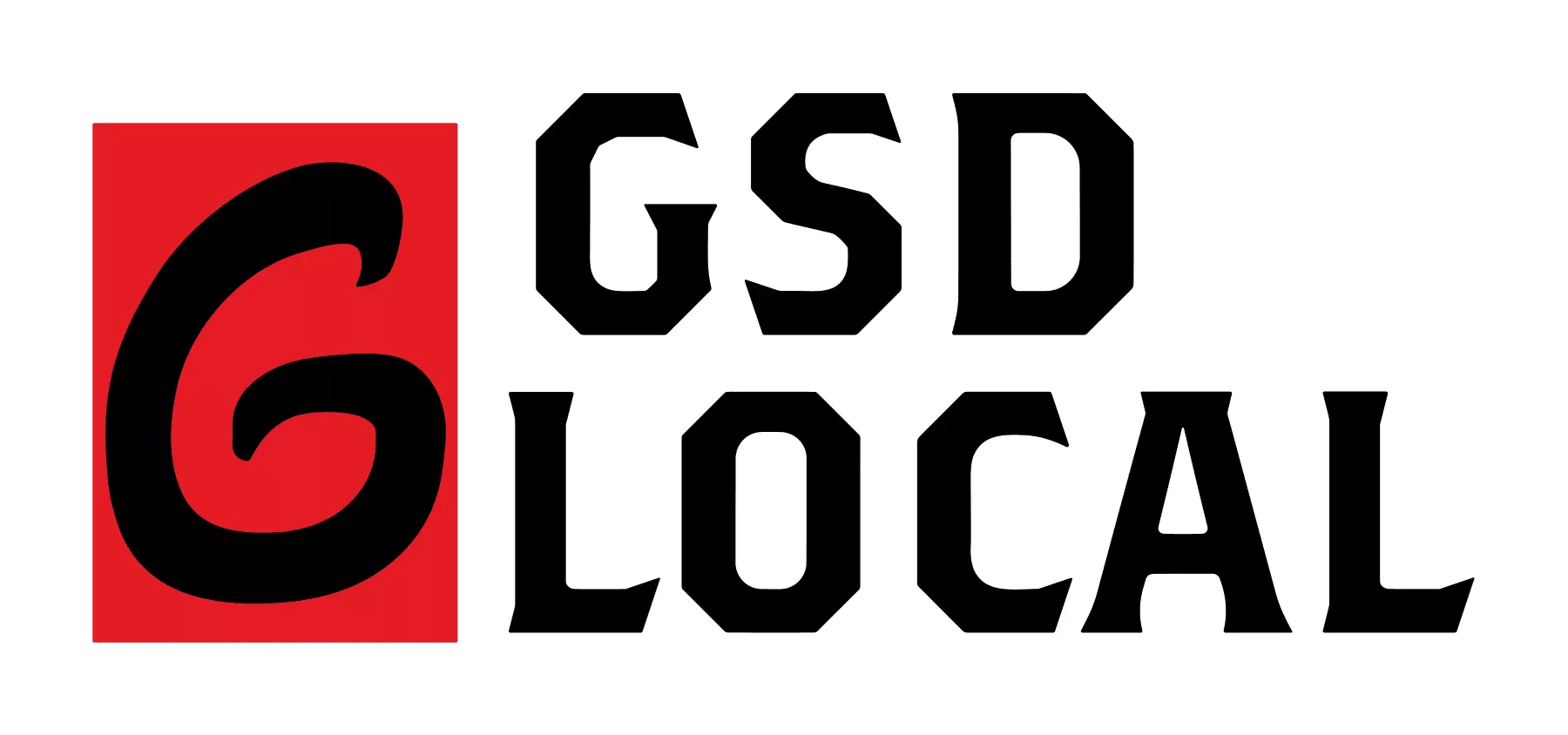GOOGLE OR CHATGPT?...........
Google AI Overviews vs ChatGPT: Where Should Lawyers Focus Their Marketing in 2025?
How to Show Up Everywhere Clients Search
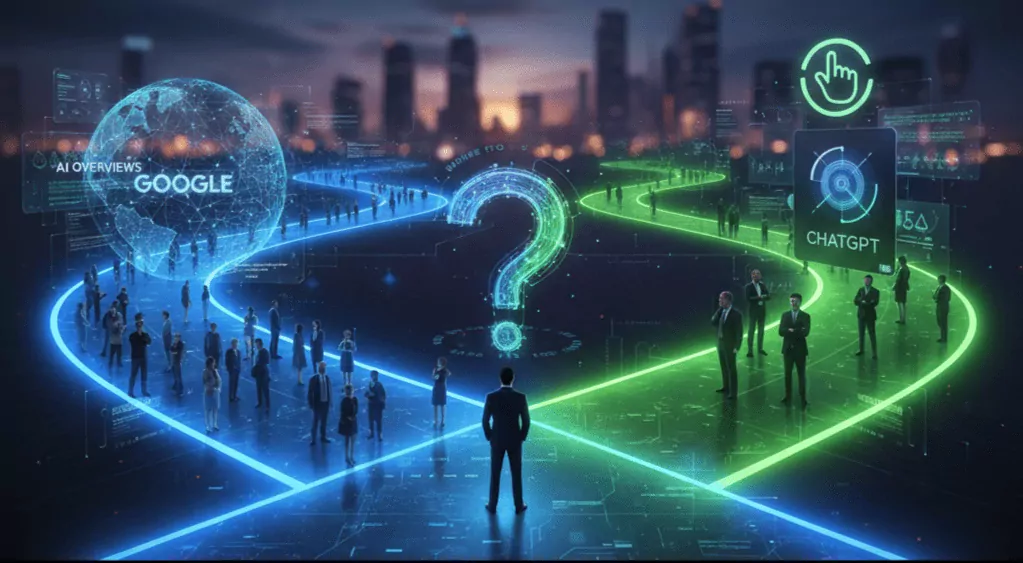
You've heard the advice.
"Optimize for AI search."
"Get recommended by Claude."
Great. But here's the problem:
You don't have unlimited time or budget.
You can't be everywhere at once. You can't master every platform. You can't optimize for everything.
So the question becomes: Where do you actually invest your effort?
Google AI Overviews? ChatGPT? Both?
And if you pick wrong, you waste months spinning your wheels while competitors dominate the platform that actually matters.
Let me cut through the noise and show you exactly where lawyers should focus in 2025.
The Question Every Attorney Is Asking
Here's what I hear constantly:
"Should I optimize for Google or ChatGPT?"
"Which platform gets more legal searches?"
"Do I need to pick one or do both?"
"Where are my potential clients actually searching?"
Fair questions. And the answer matters because your time is limited.
You're running a practice. Meeting with clients. Handling cases. Doing the actual legal work that pays the bills.
You don't have 40 hours a week to become a marketing expert.
So you need to know: Where does effort matter most?
Let me break it down.
Google AI Overviews: The Evolution of Search
First, let's talk about what Google AI Overviews actually are.
You've seen them. When you Google a question, sometimes you get this AI-generated summary box at the top.
Not the traditional "10 blue links." An actual answer synthesized by AI.
Example: Someone searches "Do I need a lawyer for a DUI in Washington?"
Google AI Overview shows a summary. Maybe 3-4 paragraphs. Sources listed below.
This is Google's answer to ChatGPT.
They're not showing you options anymore. They're giving you the answer — and citing sources.
What This Means for Lawyers:
Google AI Overviews pull from:
Your website content
Your Google Business Profile
High-authority legal directories
Content that's already ranking well
Translation: If you're doing good SEO, you have a shot at Google AI Overviews.
But there's a catch.
The Google AI Overview Problem:
Google still shows multiple sources. The AI synthesizes from several sites.
So even if your content is cited, you're sharing the spotlight with 2-4 other law firms.
You're not THE answer. You're ONE OF the answers.
That's different from ChatGPT.
ChatGPT: The Recommendation Engine
ChatGPT works completely differently.
When someone asks "Who's a good DUI attorney in Seattle?" — ChatGPT doesn't show 10 options.
It recommends one. Maybe two.
"I'd suggest reaching out to Sarah Martinez at Martinez Law. She specializes in DUI defense and has excellent client reviews."
Done. No comparison shopping. No scrolling through options.
ChatGPT is making the decision FOR the searcher.
What This Means for Lawyers:
ChatGPT recommendations are based on:
Consistent online presence across platforms
Schema markup (critical for AI understanding)
Review volume and recency
Content depth demonstrating expertise
Video presence showing authenticity
Third-party validation (mentions on other sites)
Translation: ChatGPT rewards authority signals more than keyword optimization.
The ChatGPT Advantage:
When ChatGPT recommends you, you're not competing with 5 other firms.
You ARE the recommendation.
That's massive. Because people trust AI recommendations like they trust friend referrals.
"ChatGPT said to call you" is the new "My friend said you're great."
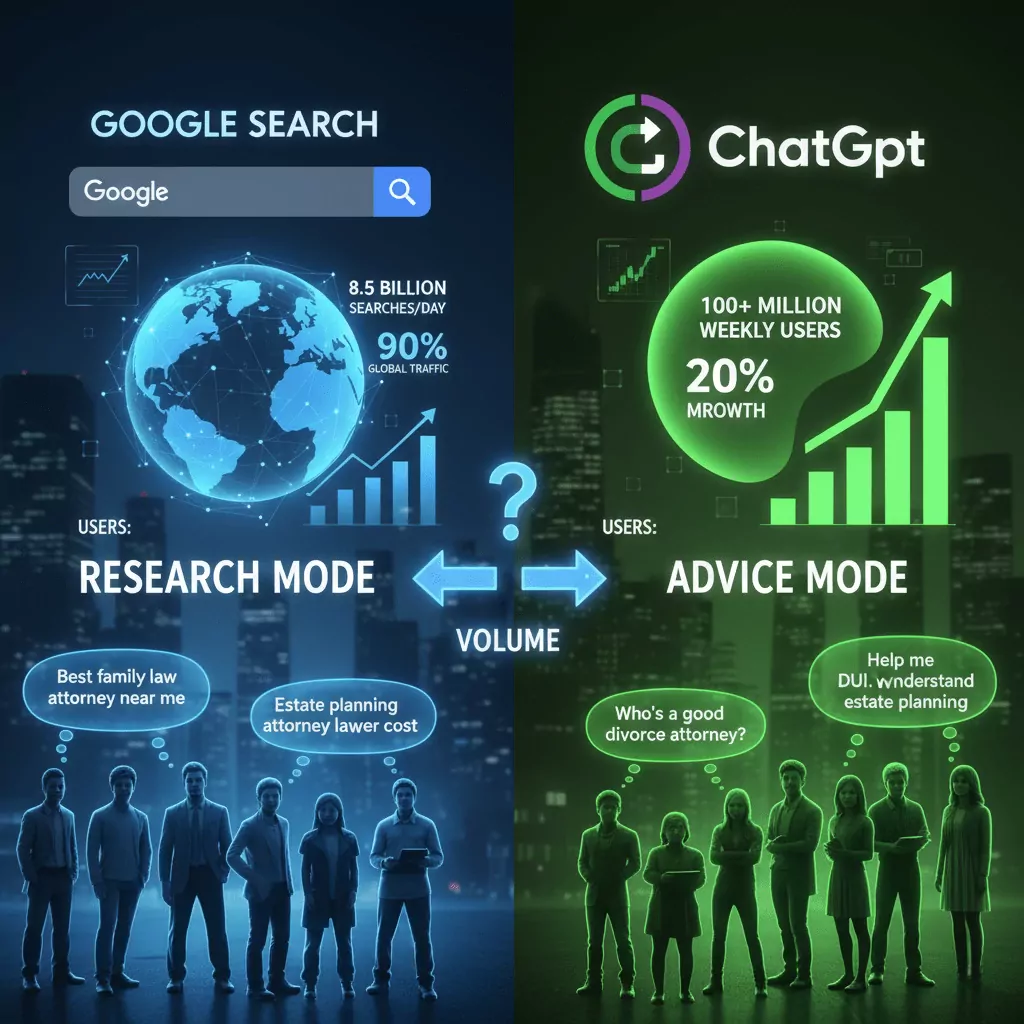
The Platform Usage Reality Check
Let's talk numbers.
Google Search Volume:
8.5 billion searches per day globally
~90% of all search traffic
Mature user base (everyone uses Google)
Local intent searches dominate for lawyers
ChatGPT Usage:
100+ million weekly active users (as of late 2024)
Growing 20%+ month over month
Younger, tech-savvy demographic
Question-based, advice-seeking queries
Here's the truth: Google still gets way more traffic.
But ChatGPT users have different intent.
Google Users:
"DUI lawyer Seattle" (searching for options)
"Best family law attorney near me" (comparison shopping)
"Estate planning lawyer cost" (researching)
They're in research mode. Comparing. Evaluating. Price shopping.
ChatGPT Users:
"I got a DUI. What should I do?" (seeking guidance)
"Who's a good divorce attorney to work with?" (asking for recommendation)
"Help me understand estate planning" (learning first, hiring second)
They're in advice mode. They want help NOW. They trust AI to guide them.
Different platforms. Different intent. Different results.
The Conversion Quality Difference
Here's what matters more than volume: Quality of leads.
Google AI Overview Leads:
Often price shopping
Comparing multiple firms
May not call for days/weeks
Lower trust (still researching)
Higher competition (saw 3-5 firms)
Conversion rate: 1-3% typically
ChatGPT Recommendation Leads:
Pre-sold on you specifically
AI vouched for you (social proof)
Often call same day
Higher trust (AI recommended)
No comparison (you're THE choice)
Conversion rate: 10-25% typically
Yes, you read that right.
ChatGPT leads convert 5-10X better because they're not shopping. They're seeking the person AI told them to hire.
Platform Comparison: The Strategic Breakdown
Let me make this crystal clear.
GOOGLE AI OVERVIEWS
Strengths: ✅ Massive traffic volume (billions of searches) ✅ High local intent ("lawyer near me") ✅ Builds on existing SEO work ✅ Familiar to all demographics ✅ Captures ready-to-hire searchers
Weaknesses: ❌ Shared recommendations (you're one of several) ❌ Price-shopping mentality ❌ Requires strong existing SEO ❌ Competitive (everyone optimizes for Google) ❌ Lower conversion rates
Best for:
Established firms with good SEO
High-volume practice areas
Competitive markets where visibility matters
Attorneys who need consistent lead flow
CHATGPT
Strengths: ✅ Exclusive recommendations (you're THE choice) ✅ Pre-sold leads (AI vouched for you) ✅ Higher conversion rates (5-10X) ✅ Less competition (most lawyers aren't optimizing) ✅ Growing user base (20%+ monthly)
Weaknesses: ❌ Lower total volume (vs Google) ❌ Requires strong authority signals ❌ Newer user behavior (still evolving) ❌ Skews younger demographic ❌ Less predictable (recommendations vary)
Best for:
Boutique firms seeking quality over quantity
Attorneys building authority-based practices
Early adopters willing to test new platforms
Firms tired of price-shopping leads
The Uncomfortable Truth
Here's what most marketing agencies won't tell you:
You can't win at both immediately.
Not with limited time. Not with limited budget.
The optimization strategies overlap, but they're not identical.
Google AI Overviews prioritize:
Traditional SEO signals
Keyword optimization
Website speed and technical SEO
Local citations and NAP consistency
Google Business Profile optimization
ChatGPT prioritizes:
Authority signals and trust
Consistent content creation
Schema markup (even more critical)
Review recency and volume
Video content and authenticity
You can do SOME things that help both. (Schema, reviews, content)
But if you're trying to master both platforms from scratch, you'll spread yourself too thin and dominate neither.
Pick your battlefield.
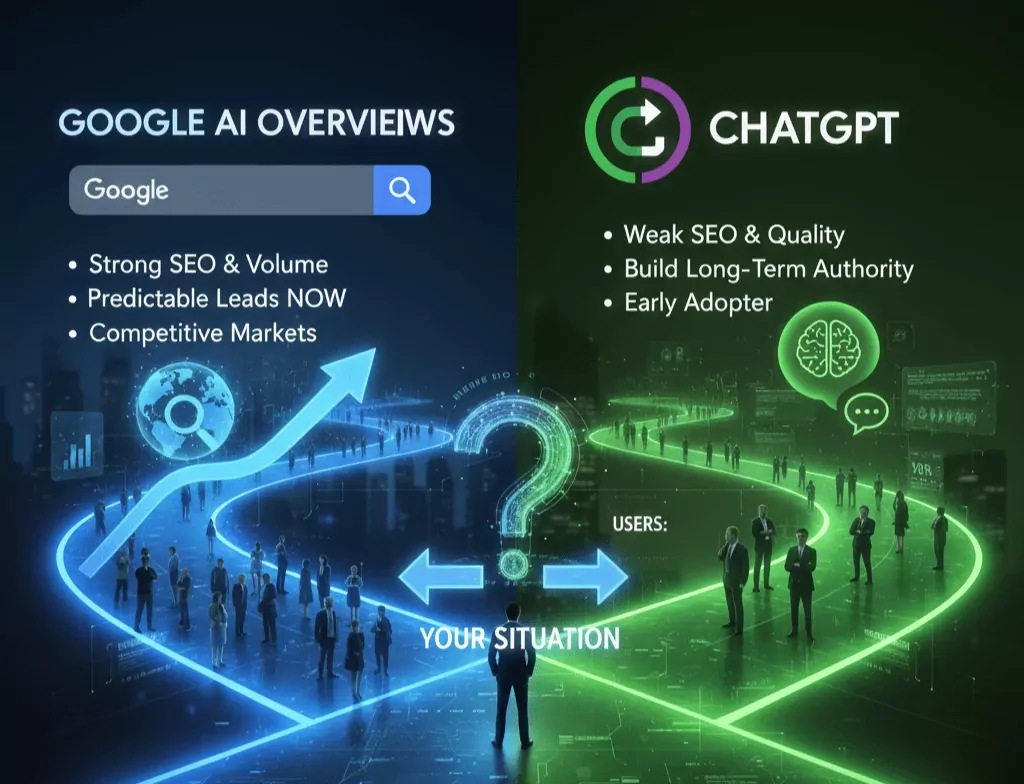
My Strategic Recommendation (Based on Your Situation)
Let me give you the framework.
Choose GOOGLE AI OVERVIEWS if:
✅ You already have decent SEO (ranking page 1-2) ✅ You practice in high-volume areas (personal injury, family law, DUI) ✅ You're in a competitive metro market (lots of searches) ✅ You need predictable lead volume NOW ✅ You have budget for ongoing SEO work
Action Plan:
Optimize existing high-ranking content
Add structured data (schema markup)
Improve Google Business Profile
Build local citations
Target featured snippet opportunities
Timeline: 60-90 days to see movement
Choose CHATGPT if:
✅ Your SEO is weak or nonexistent ✅ You're tired of low-quality, price-shopping leads ✅ You want to build long-term authority ✅ You're comfortable with smaller volume, higher quality ✅ You're an early adopter willing to test new approaches
Action Plan:
Build consistent content presence (video + written)
Implement comprehensive schema markup for attorneys (or whatever your business model)
Collect recent reviews systematically
Create authority content (answer real questions)
Show up authentically (video is critical)
Timeline: 60-90 days to start appearing
Do BOTH if:
✅ You have dedicated marketing resources (team or agency) ✅ You have 10+ hours/week for content creation ✅ Your SEO is already strong ✅ You're committed to long-term authority building ✅ You can invest 6+ months without immediate ROI pressure
Action Plan:
Maintain Google SEO fundamentals
Add AI-specific optimizations (schema, content depth)
Build consistent authority content for ChatGPT
Leverage content across both platforms
Track which platform drives better ROI
Timeline: 90-180 days for full optimization
The "Right Now" Strategy Most Lawyers Should Follow
If you're reading this and thinking "I just want to know what to DO" - here's my advice:
Start with Google AI Overviews IF:
You already rank for some keywords
You need leads this month/quarter
You understand SEO basics
Start with ChatGPT IF:
Your SEO is broken or nonexistent
You want better quality over quantity
You're building from scratch anyway
BUT HERE'S THE SECRET:
There's massive overlap in what BOTH platforms need:
Schema markup (critical for both)
Helpful content (answering real questions)
Recent reviews (trust signals)
Consistent presence (ongoing activity)
Clear expertise (specialty focus)
Do these five things, and you'll improve in BOTH.
So stop overthinking the platform choice.
Start building the foundation that works everywhere.
What Actually Matters More Than Platform Choice
Here's what nobody talks about:
The platform doesn't matter if your fundamentals suck.
I've seen attorneys obsess over "Google vs ChatGPT" while their:
Website loads in 8 seconds
Schema markup is nonexistent
Last Google review is from 2021
Content library is one blog post from 2019
Social media is dead for 6 months
Fix the foundation first.
Then worry about platform strategy.
Because here's the truth: Strong fundamentals win on every platform.
Schema markup helps Google AND ChatGPT
Recent reviews matter to Google AND ChatGPT
Quality content ranks on Google AND ChatGPT
Authority signals work on Google AND ChatGPT
Stop optimizing for platforms. Start optimizing for trust.
The Compounding Strategy That Wins Long-Term
Want to know what the smartest attorneys are doing?
They're not choosing.
They're building assets that work everywhere:
Asset #1: Content Library
50+ articles answering every client question.
Works for:
Google AI Overviews (pulls from your content)
ChatGPT (recognizes your expertise)
Direct search (people find your articles)
Email marketing (nurture leads)
Asset #2: Video Presence
100+ short educational videos.
Works for:
ChatGPT (authenticity signal)
YouTube search (second largest search engine)
Social media (LinkedIn, Instagram)
Website conversion (builds trust)
Asset #3: Review Engine
Systematic collection of 5-star reviews.
Works for:
Google rankings and AI Overviews
ChatGPT recommendations
Website conversion (social proof)
Reputation management
Asset #4: Schema Markup
Complete structured data implementation.
Works for:
Google understanding
ChatGPT understanding
Voice search
Future AI platforms
Build these four assets, and you win on every platform that matters.
Now and in the future.
The Future Nobody's Talking About
Here's my prediction:
In 12-24 months, this won't be "Google vs ChatGPT."
It'll be:
Google AI Overviews
ChatGPT
Claude
Perplexity
Microsoft Copilot
Whatever comes next
New AI platforms will keep launching.
If you optimize specifically for one platform, you'll have to re-optimize every time a new platform emerges.
But if you build real authority assets?
They work everywhere. Forever.
That's the difference between tactics and strategy.
Tactics: "Hack Google AI Overviews with these 7 tricks"
Strategy: "Build undeniable authority that AI can't ignore"
One works for 6 months. The other works for 6 years.
Choose wisely.
The Decision Framework
Still not sure where to focus? Ask yourself these questions:
Question 1: Do I need leads THIS quarter or can I build for next year?
Need leads now → Google AI Overviews
Building for future → ChatGPT
Question 2: Is my current SEO strong or weak?
Strong SEO → Build on it with Google AI optimization
Weak SEO → Start fresh with ChatGPT authority
Question 3: Do I want volume or quality?
Volume → Google AI Overviews
Quality → ChatGPT
Question 4: Am I building a volume practice or boutique practice?
Volume practice → Google AI Overviews
Boutique practice → ChatGPT
Question 5: Do I have time/resources for both?
Yes → Do both
No → Pick one based on answers above
Be honest with yourself.
Don't try to do everything. Do one thing well.
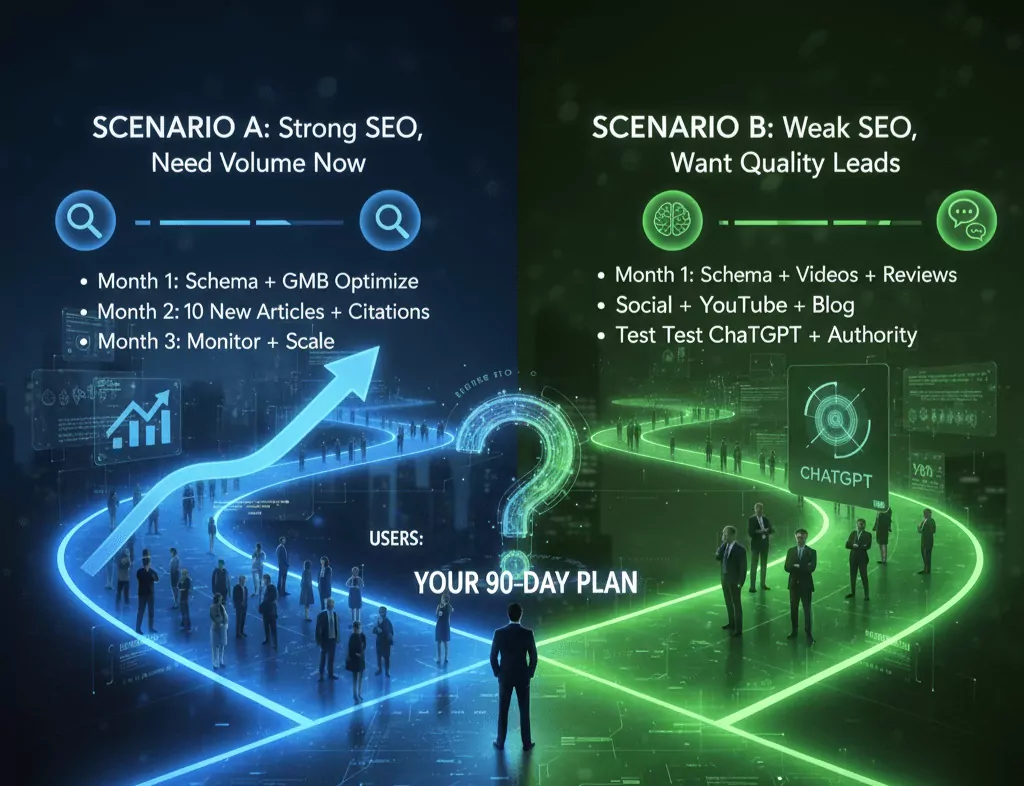
The "Just Tell Me What to Do" Action Plan
Alright. Here's your 90-day plan based on where you are:
SCENARIO A: Strong SEO, Need Volume Now
Focus: Google AI Overviews
Month 1:
Add schema markup to all pages
Optimize top 10 ranking articles for featured snippets
Update Google Business Profile completely
Target "People Also Ask" questions with content
Month 2:
Create 10 new articles targeting AI Overview opportunities
Build local citations
Collect 10+ new Google reviews
Improve page speed
Month 3:
Monitor Google Search Console for AI Overview appearances
Double down on what's working
Create more content in successful topics
SCENARIO B: Weak SEO, Want Quality Leads
Focus: ChatGPT
Month 1:
Implement complete schema markup
Create 15-20 short educational videos
Write 10 articles answering real client questions
Set up review collection system
Month 2:
Post 3-4X per week on LinkedIn
Upload all videos to YouTube
Publish 2-3 blog posts weekly
Get 15+ new reviews
Month 3:
Test ChatGPT to see if you appear
Continue consistent content production
Build video library to 50+ videos
Establish authority presence
SCENARIO C: Have Resources, Want Both
Focus: Dual Optimization
Month 1:
Schema markup (helps both)
Content creation system (publish 3X/week)
Review collection (helps both)
Google Business Profile optimization
Month 2:
Google: Featured snippet targeting
ChatGPT: Video content creation
Both: Answer common client questions
Both: Build review momentum
Month 3:
Measure which platform drives better ROI
Allocate more resources to winner
Maintain baseline effort on both
Optimize based on data
Stop Overthinking. Start Building.
Look, the platform debate is a distraction.
Google vs ChatGPT. Traditional vs AI. Old school vs new school.
None of it matters if you're not building real authority.
The attorneys winning right now — on Google AND ChatGPT — aren't the ones with the cleverest hacks.
They're the ones who:
Show up consistently
Answer real questions
Build genuine expertise
Earn real trust
Create real value
Do that, and every platform works.
Don't do that, and no platform saves you.
Ready to dominate both Google AI Overviews and ChatGPT?
📞 Schedule a free 15-minute Authority Audit and we'll show you exactly where you should focus first based on YOUR specific situation — not generic advice.
Because the right platform for your competitor might be the wrong platform for you.
Let's find YOUR winning strategy. Contact me today!
H2 Goes Here
This is a paragraph
Frequently Asked Questions
Should I optimize for both Google AI Overviews and ChatGPT or pick one?
The answer depends on your resources and current position. If you have strong existing SEO and need leads now, focus on Google AI Overviews first since you're building on an existing foundation. If your SEO is weak or you're starting fresh, ChatGPT may offer faster results with better lead quality. However, the smartest long-term strategy is building authority assets that work on both platforms: schema markup, helpful content, recent reviews, and consistent presence. These fundamentals benefit every AI platform without requiring you to optimize separately for each one.
Which platform do potential clients use more when looking for lawyers?
Google still dominates with billions of daily searches and captures the majority of "lawyer near me" queries. However, ChatGPT usage is growing 20%+ monthly and represents a different type of searcher. Google users are typically comparing options and price shopping. ChatGPT users are seeking recommendations and guidance, often converting at 5-10X higher rates. The volume advantage goes to Google, but the conversion quality advantage goes to ChatGPT. Your ideal platform depends on whether you prioritize lead volume or lead quality.
Do the same optimization strategies work for both platforms?
Yes and no. Both platforms value schema markup, recent reviews, helpful content, and demonstrated expertise. These foundational elements help you on both. However, Google AI Overviews prioritize traditional SEO signals like keywords, backlinks, and page speed, while ChatGPT emphasizes authority signals like video content, consistent publishing, and third-party validation. If you build strong fundamentals (schema, content, reviews), you'll improve on both platforms. But if you're optimizing from scratch, the specific tactics differ enough that trying to master both simultaneously can spread you too thin.
How long does it take to start appearing in Google AI Overviews vs ChatGPT?
If you already have decent SEO, Google AI Overviews can happen in 60-90 days with proper optimization (schema markup, featured snippet targeting, content updates). ChatGPT typically takes 60-120 days to start recommending you, depending on how quickly you build authority signals. The key difference: Google AI Overviews are more predictable (you can see progress in Search Console), while ChatGPT recommendations are less transparent (you won't know until you test queries). Both require consistent effort over months, not weeks. Neither is a quick fix.
Can small law firms compete with large firms on these AI platforms?
Absolutely - and often small firms have advantages. Google AI Overviews and ChatGPT both favor clear expertise and authenticity over firm size. A solo practitioner who consistently demonstrates estate planning expertise can outrank a 50-attorney general practice firm because AI recognizes focused authority. Large firms often have outdated content, generic messaging, and inconsistent presence. Small firms that show up authentically, answer specific questions, and build genuine expertise can dominate AI recommendations regardless of size. The game has shifted from budget to authority.
What's the fastest way for busy attorneys to maintain consistent presence on both platforms without it becoming a full-time job?
This is exactly why content systems matter more than individual effort. The most efficient approach is content multiplication: capture your expertise once, deploy it everywhere. That's what ClipCred does - we conduct one focused monthly interview where you share your legal knowledge and insights. We transform that conversation into 30 days of content: short-form videos for authenticity, written articles for depth, social posts for consistency, and everything optimized with proper schema markup for AI comprehension. You invest one hour monthly. We handle production, optimization, and distribution. Your expertise appears daily on platforms that matter - building authority on both Google and ChatGPT simultaneously - while you stay focused on practicing law.
Will these AI platforms keep changing, making today's optimization worthless tomorrow?
Platform-specific hacks and tricks will absolutely become obsolete. But fundamental authority signals remain constant across all AI systems, current and future. Schema markup, helpful content, recent reviews, video authenticity, and demonstrated expertise work on Google, ChatGPT, Claude, Perplexity, and whatever launches next. That's why smart attorneys build authority assets instead of chasing platform-specific tactics. Assets compound over time and work everywhere. Tactics expire when platforms update. Focus on building real credibility that any AI system can recognize and verify - that strategy is future-proof.
